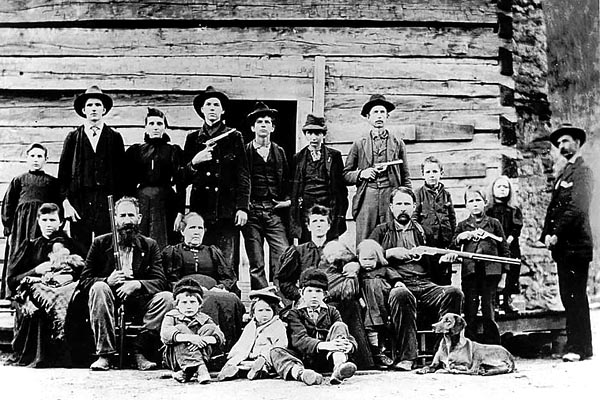 |
| The Hatfield clan, 1897 (Wikipedia) |
Note: A few violent skirmishes between two rural families has become a model "feud" in this oft-told historical tale.
Get Ready: Is there anything that someone might do to you that was so bad that, generations later, your descendants are still killing each other for it?
Sometimes a legend is repeated so often that we forget it's grounded in cold, hard facts. Such is the "legendary" feud between two rural families living on the Kentucky/West Virginia border during and after the American Civil War (1861-1865).
The trouble started along the Tug Fork of the Big Sandy River, more-or-less along the border between West Virginia (on the east side) and Kentucky (on the west). The Hatfields, initially led by William Anderson Hatfield, colorfully known as "Devil Anse," lived mostly on the east (West Virginia) side; the McCoys of Kentucky were led by Randolph "Ole Ran'l" McCoy. Both areas had originally entered the Civil War on the Confederate (southern, rebel, pro-slavery) side, though the state of West Virginia was formed in 1863 when it seceded from the Confederate state of Virginia and joined the Union (northern, Yankee, anti-slavery) side.
Nevertheless, virtually all of the Hatfields and the McCoys were on the same (the southern) side--except for one. Asa Harmon McCoy fought for the Union, and would become the initial casus belli for the feud. While serving in the Union Army, Asa had sustained a leg fracture that led to his hospitalization. When he was released from the hospital and mustered out of the service, he headed for home--where a group of vigilantes called the "Logan Wildcats," serving as Confederate Home Guards, killed him.
The first suspect was Devil Anse Hatfield, until it was proven he was sick in bed at the time of the murder. It was probably Devil Anse's uncle, Jim Vance, who led the attack instead.
Retribution was surprisingly slow. No arrests were made in the case, and the next feud-related death did not occur until over a decade later. In 1878, a dispute arose between Floyd Hatfield, Anse's cousin, and Randolph McCoy: Floyd had a pig, and Randolph insisted that the "earmarks" (notches on the pig's ear) proved it to be his. The local judge was asked to settle the dispute. Not surprisingly, Justice Anderson "Preacher Anse" Hatfield ruled for Floyd Hatfield, though his decision was based on the testimony of one Bill Staton, who was related to both families. Two years later, a couple of McCoys killed Staton for his trouble; they were acquitted of the crime on grounds of self-defense.
The next thing you know, Roseanna McCoy hooks up with Devil Anse's son Johnson, called "Johnse." The families got involved, Johnse was arrested for bootlegging, and the couple split up--even though Roseanna was pregnant. Johnse ended up marrying her cousin Nancy.
Things escalated when three of Roseanna's brothers killed Anse's brother, stabbing him 26 times before finishing him off by shooting him. A large party of men under Anse's command snatched the culprits from the constables' custody and executed them with a total of 50 shots.
Warrants were issued, but all of the Hatfields eluded arrest, and the feud continued with numerous more incidents of violence. It peaked with the New Year's Night Massacre of 1888, when a party under Cap Hatfield and Jim Vance surrounded a McCoy cabin and fired on its sleeping inhabitants, then set fire to it. Numerous McCoys were killed.
A posse sympathetic to the McCoys ran down Jim Vance and killed him in the woods; many more Hatfield supporters were captured or killed. At last, eight Hatfields and supporters were indicted for the murder of a child killed during the attack. Seven received life sentences, and one--Ellison "Cottontop" Mounts--was hanged and buried in an unmarked grave. Mounts died claiming, "The Hatfields made me do it."
Over a dozen people died in the feud from 1880 to 1891; today, members of both families cooperate in projects promoting peace and understanding.
--------Read more: https://en.wikipedia.org/wiki/Hatfield%E2%80%93McCoy_feud
Practice: Match the term to its definition below:
- acquitted
- casus belli
- indicted
- inhabitants
- mustered out
- peaked
- seceded
- self-defense
- testimony
- vigilantes
- protecting oneself
- officially withdrew
- formally accused
- a reason for fighting
- declared "not guilty"
- the statement of a witness
- people who live somewhere
- ones who take the law into their own hands
- discharged from service
- came to a climax
Answers are in the first comment below.
Submitted to the Shenzhen Daily for May 20, 2021


Answers to the Practice: 1. e; 2. d; 3. c; 4. g; 5. i; 6. j; 7. b; 8. a; 9. f; 10. h
ReplyDelete